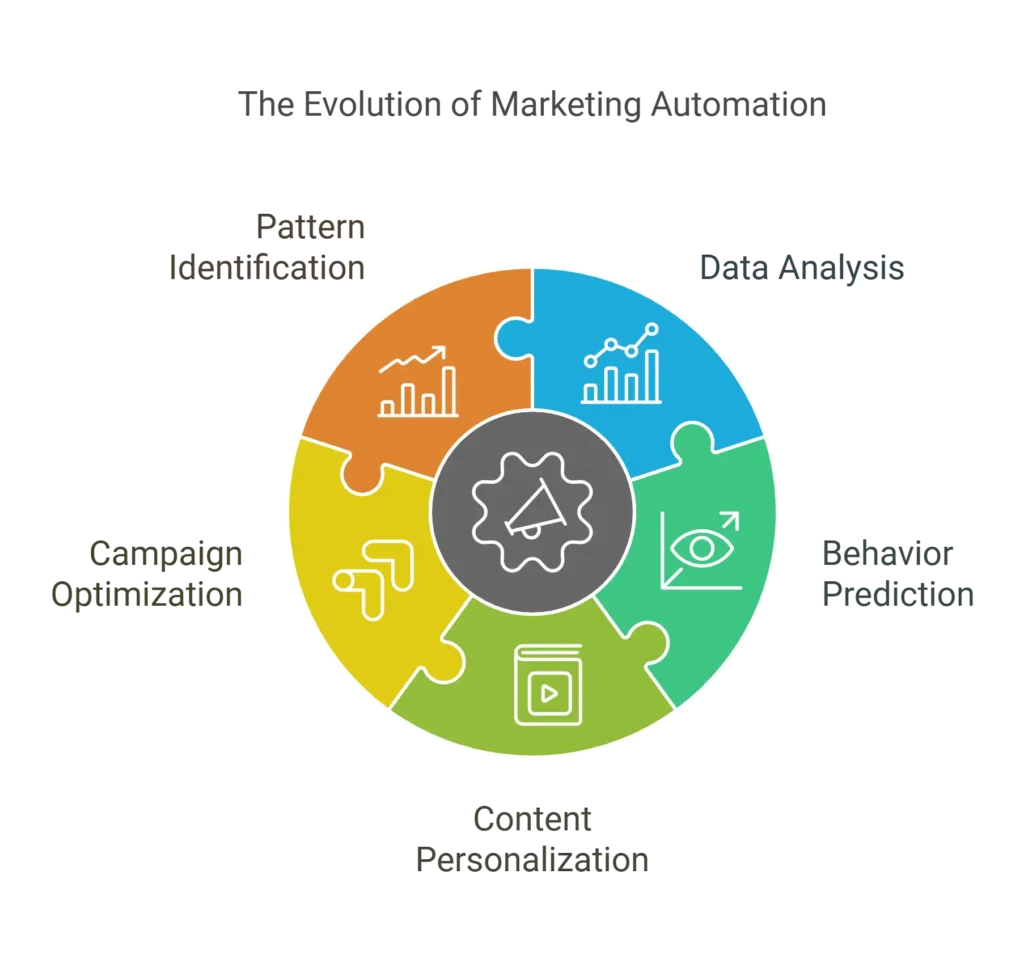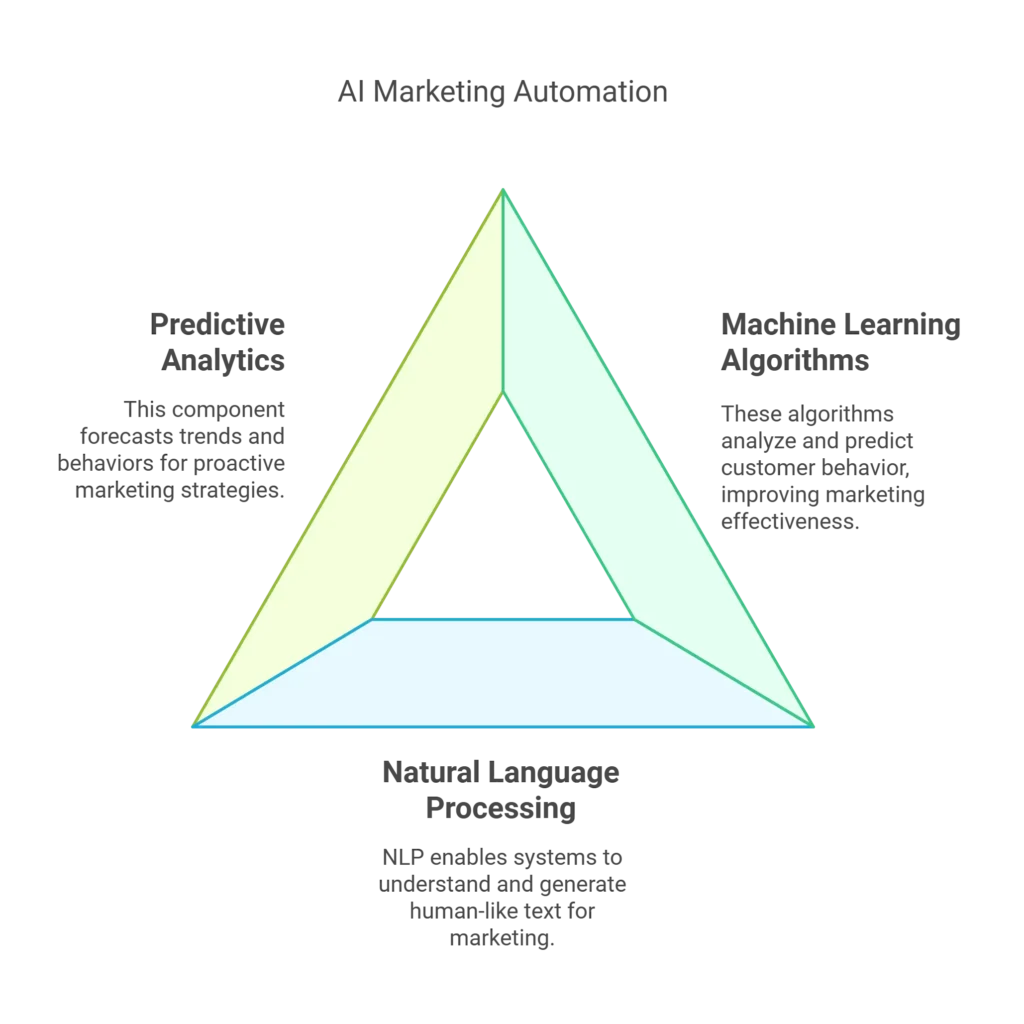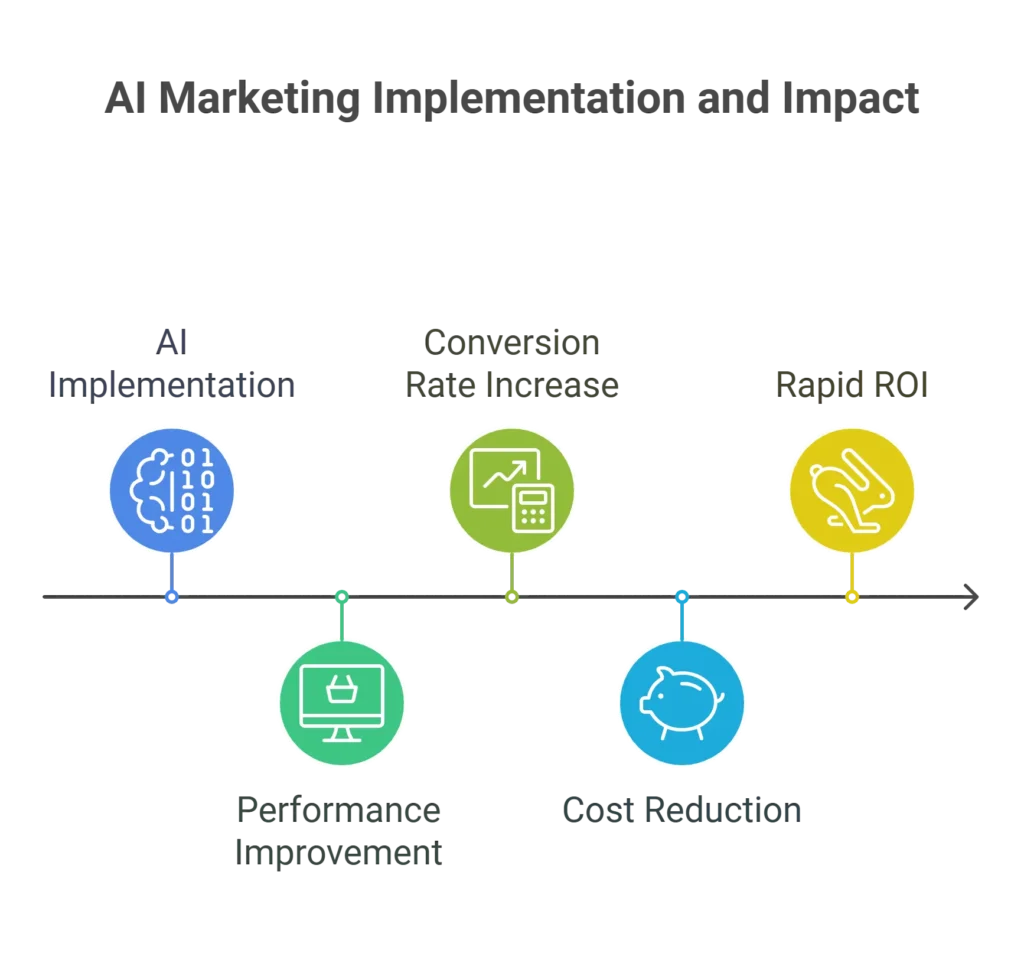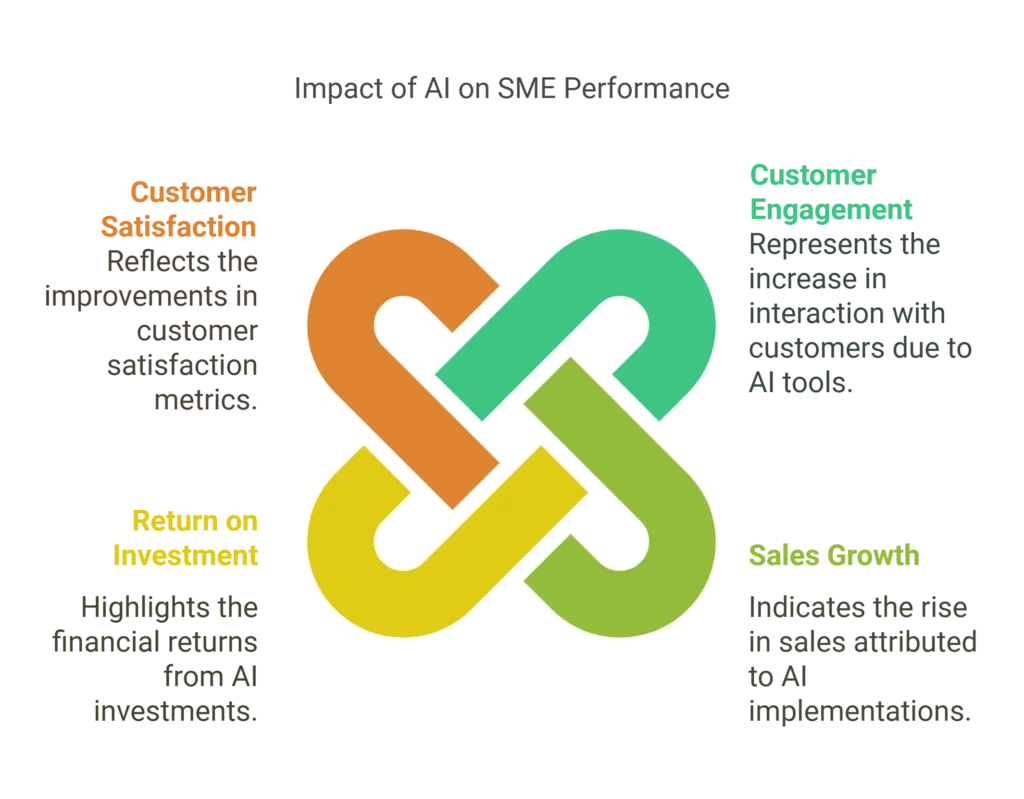AI Marketing Automation: The Complete Guide for 2025
Did you know that companies using AI marketing automation see an average increase in sales productivity of 14.5%? As we navigate through 2025, artificial intelligence isn’t just transforming marketing; it’s revolutionizing how businesses connect with their customers at every touchpoint.
Key Takeaways
- Transform Marketing with AI: Businesses using AI marketing automation report a 14.5% boost in sales productivity and significant improvements in customer engagement.
- Market Growth & Trends: The AI marketing automation market is expected to reach $8.42 billion by 2027, with a CAGR of 19.2% from 2020 to 2026.
- AI’s Core Pillars: Machine learning, natural language processing (NLP), and predictive analytics are the key technologies driving this transformation.
- Proven Success Stories: E-commerce businesses have seen a 30% increase in conversions, and SMEs report up to 300% ROI with AI-powered marketing.
- Future Trends: 70% of marketers plan to increase their AI investments, signaling a massive industry shift in 2025.
- Implementation Made Simple: Clear timelines, team training, and thorough testing are essential for successful AI marketing automation adoption.
- Enhanced Results: Companies implementing AI report a 63% improvement in customer targeting and up to a 15% increase in conversion rates.
According to recent research from MDPI, organizations implementing AI-driven marketing strategies are seeing unprecedented levels of success in customer engagement and conversion rates.
The Evolution of Marketing Automation
Marketing automation has come a long way from simple email scheduling tools. Today’s AI-driven platforms can predict customer behavior, personalize content in real-time, and optimize campaigns automatically. Research from ResearchGate shows that the integration of artificial intelligence has transformed traditional marketing automation into a sophisticated ecosystem that can:

- Analyze vast amounts of customer data in seconds
- Predict customer behavior with remarkable accuracy
- Create personalized content at scale
- Optimize campaign performance in real-time
- Identify patterns and trends human marketers might miss
Market Overview and Growth Trends
Recent market analysis from SMB Guide indicates significant growth in the AI marketing automation sector:

- The global market is projected to reach $8.42 billion by 2027
- CAGR of 19.2% from 2020 to 2026
- 79% of companies currently use marketing automation tools, according to HubSpot
Understanding AI Marketing Automation
According to Firework’s comprehensive research, AI marketing automation combines the efficiency of automated processes with the intelligence of AI algorithms to create more effective, personalized marketing campaigns. This powerful combination enables marketers to make data-driven decisions faster and more accurately than ever before.
AI marketing automation combines intelligent algorithms with automated workflows. Tools like Mailchimp and Salesforce help businesses automate email campaigns and predict customer behavior, ensuring marketing is both personalized and efficient. These tools can save time while increasing engagement.
The Foundation of AI Marketing Automation
At its core, AI marketing automation relies on three key components:

- Machine Learning Algorithms
These algorithms analyze historical data to identify patterns and make predictions about future customer behavior. They continuously learn and improve from new data, making your marketing efforts more effective over time. - Natural Language Processing (NLP)
NLP enables systems to understand and generate human-like text, powering chatbots, content generation, and sentiment analysis. - Predictive Analytics
By analyzing historical data, predictive analytics helps forecast future trends and customer behaviors, allowing for proactive marketing strategies.
Real-World Success Stories and Case Studies
E-Commerce Revolution Through AI Marketing
A comprehensive study published by MDPI in October 2024 revealed remarkable improvements in e-commerce performance through AI implementation. Over a six-month period, businesses witnessed:

- 30% improvement in conversion rates
- 25% reduction in customer acquisition costs
- Conversion rate increased from 2% to 2.6%
The study, conducted across multiple e-commerce platforms, showed significant results within just three months of implementation, highlighting the rapid return on investment possible with AI marketing automation.
SME Success with Personalized Marketing Automation
A groundbreaking study of 150 SMEs, published on ResearchGate in September 2024, demonstrated the dramatic impact of AI tools on small and medium-sized businesses:

- 40% increase in customer engagement
- 20% rise in sales
- 300% return on investment
- Significant improvements in customer satisfaction metrics
Further research from The Science Brigade supports these findings, showing consistent improvements across various business metrics.
SMEs using ActiveCampaign have increased engagement by 40% and seen up to 300% ROI. These tools enable businesses to scale personalized marketing without the need for big budgets, making AI accessible for small businesses.
Long-term Impact Study: AI in Digital Marketing
A 24-month longitudinal study by MDPI, analyzing data from over 200 companies across multiple sectors, revealed:

- 35% increase in marketing efficiency
- 15% decrease in marketing costs
- Substantial improvements in customer retention rates
Industry Insights and Expert Perspectives
Recent analysis from Synthesia shows that 70% of marketers are planning to increase their investment in AI technologies in 2024. This trend is supported by additional research from Sixth City Marketing, which highlights the growing importance of AI in marketing strategies.
Implementation Strategy and Best Practices
Based on case studies from Invoca, successful implementation requires:

1. Clear Timeline Development
- Set realistic milestones
- Plan for adequate testing periods
- Allow time for team training
2. Team Training and Support
- Provide comprehensive training programs
- Establish support systems
- Create documentation and resources
3. Integration Testing
- Conduct thorough system testing
- Verify data flow accuracy
- Test automation workflows
Set clear timelines and use tools like ActiveCampaign to automate emails and Salesloft for customer engagement through AI chatbots. This streamlined approach improves efficiency and reduces manual work. Start small with tools like LeadSquared for lead scoring and scale as results improve.
Frequently Asked Questions About AI Marketing Automation
Current Adoption and Market Trends
Q: What is the current adoption rate of marketing automation among companies?
A: According to HubSpot’s latest research, 79% of companies are currently utilizing marketing automation tools, reflecting a significant shift toward digital transformation across industries.
Q: What are the projected growth rates for the marketing automation market?
A: SMB Guide’s market analysis shows explosive growth, with a projected CAGR of 19.2% from 2020 to 2026.
Impact and Results
Q: How does AI impact customer engagement in marketing?
Research from Firework indicates that companies using AI in marketing automation report a 63% improvement in customer targeting and segmentation.
Q: What measurable outcomes can be expected from implementing AI in marketing?
A: According to Sixth City Marketing, companies implementing AI-powered marketing automation typically see:
- Average ROI of 300%
- Up to 15% increase in conversion rates
- Significant reductions in customer acquisition costs
- Enhanced campaign effectiveness across all channels
AI tools like Hootsuite and Salesforce improve targeting and customer segmentation. Companies see up to 15% higher conversion rates and better engagement, ultimately leading to increased sales and ROI.
Future Outlook
Q: What are the emerging trends in AI marketing automation?
Synthesia’s recent report shows that the field is rapidly evolving, with 70% of marketers planning to increase their investment in AI technologies in 2024.
Stay ahead in marketing by using AI tools for better personalization and smarter strategies in 2025!
Additional Resources and Industry Research
For further insights and detailed analysis, consider exploring these additional resources:
- EcommerceBonsai Marketing Automation Statistics
- LinkedIn AI Trends Analysis
- Future EMNuvens Research
- Tandfonline Digital Marketing Study
If you’re looking to dive deeper into the world of AI marketing automation, explore these tools that can help elevate your marketing strategies:
- HubSpot Marketing Hub: Streamline your marketing workflows and improve customer relationship management.
- Mailchimp: Automate and personalize your email marketing campaigns with AI-powered segmentation.
- Salesforce Einstein: Leverage predictive analytics to enhance CRM strategies and forecast customer behavior.
- Hootsuite Insights: Gain real-time insights into customer sentiment across social media platforms.
- ActiveCampaign: Use AI to automate email marketing, improve customer engagement, and increase sales productivity.
Conclusion
The evidence presented by multiple research sources, including MDPI and ResearchGate, clearly shows that AI marketing automation is no longer just a competitive advantage—it’s becoming a necessary component of successful marketing strategies.
As we move further into 2024 and beyond, the adoption of AI marketing automation will likely become not just an advantage but a necessity for businesses looking to remain competitive in an increasingly digital marketplace.
Next Steps
- Assess your current marketing automation needs
- Evaluate potential AI marketing automation platforms
- Develop an implementation timeline
- Plan for team training and support
- Begin with a pilot program
- Scale based on results and learnings
The future of marketing is here, and it’s powered by AI. Take the first step toward transformation today.




